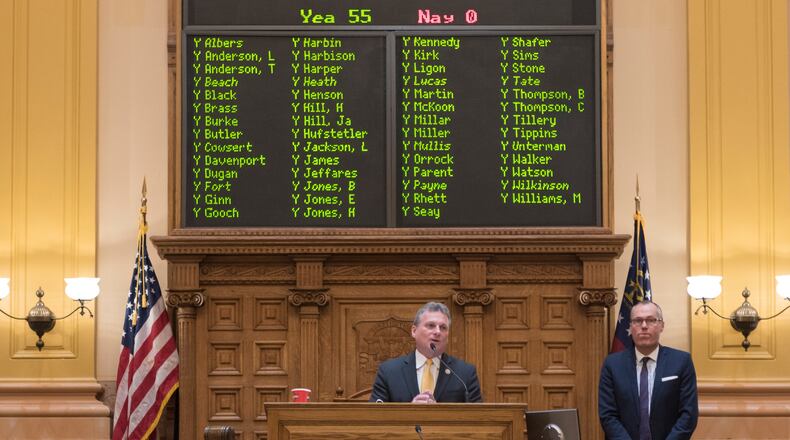As Gov. Nathan Deal raised concerns again this week that the House GOP healthcare plan could "punish" Georgia and other states that didn't expand the Medicaid program, a leading Georgia supporter of the plan urged patience.
U.S. Rep. Buddy Carter is Georgia’s sole member on the House’s Energy Committee, and he voted to approve the plan to replace the Affordable Care Act. Pressed on Deal’s concerns at the statehouse Wednesday, he said the measure is a work-in-progress.
“Certainly those concerns are legitimate. And that is one of the biggest hurdles we have to get over before we can get this bill finalized. Keep in mind, we’re only in the first phase,” said the Savannah Republican. “We want to make those states that didn’t expand Medicaid whole.”
The governor on Wednesday renewed his call to allow Georgia and other states to craft their own healthcare policies.
“What we’re finding out is what I knew all along: When you give somebody something for nothing, it’s going to be very difficult to take that away,” he said. “And those states that expanded their Medicaid rolls are finding it’s very difficult to take them off the rolls, they’re going to have to find some alternative. And that’s perfectly fine with me – as long as they don’t punish Georgia in the process.”
The imperiled measure is under attack from both Democrats and conservative Republicans after the nonpartisan Congressional Budget Office released an analysis this week that found as many as 24 million Americans would lose health insurance coverage by 2026. Carter and other supporters have cast doubt on the analysis.
The plan would allow the more than two dozen states that have expanded the Medicaid program to continue receiving the generous federal funding until 2020. But the enrollment under the expansion would freeze in 2020, meaning that states adding new residents to the rolls after that would do so without the federal government covering nearly all their costs.
For Georgia and other states that have not expanded their Medicaid programs, the GOP plan would provide $10 billion over five years for health care funding. That puts Georgia in the tricky position of deciding whether to expand the program — despite repeated vows from Deal that he won't — or accepting the payout.
Deal has said he's still glad that Georgia refused to expand Medicaid because it would be too expensive in the long run, repeating a mantra of his 2014 re-election bid against an opponent who vowed to accept the federal money to grow the program. He told Georgia Health News his message was simple: "We want to be treated fairly."
“As a governor, and a Republican governor, my concern is that states like ours that did not expand Medicaid coverage is that we not be punished, that we be treated fairly in the process of the reform,” Deal added on Wednesday.
Carter said he had his own message for Deal and others concerned with the proposal.
“We will certainly respect the governor and whatever he and his staff and the Legislature decide to do,” he said. “But we are doing our best to bring about parity, to make those states whole and make it as even as we can between the expansion states and the non-expansion states.
Meanwhile, GOP dissent over the plan is mounting. State Sen. Chuck Hufstetler, a member of Lt. Gov. Casey Cagle’s health panel, said Georgia would be receiving “significantly less money” under the House plan than other states that expanded the program.
“It doesn’t seem that a state that has had a fiscally conservative plan should be punished while a state that has a more generous plan should be rewarded,” the Rome Republican said on Wednesday. “But that’s how this plan seems to work.”
More: Georgia Republicans are sharply divided over House healthcare plan
About the Author
The Latest
Featured



